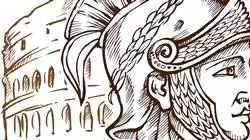University certificate
The world's largest faculty of humanities”
Description
As a philosophy professional, and in your work as a teacher, you need to be specialized in everything related to the teaching of Latin and classical culture to be able to offer quality education”

It is necessary to create qualified professionals who know, in addition to the subject of Latin and classical culture, the key elements to teach it correctly within our educational model, taking into account the new teaching methodologies.
This professional master’s degree offers a broad and complete vision of the contents taught in the subjects of Latin and classical culture, with the aim of training professionals capable of effectively developing the teaching-learning process of a vital subject in the humanistic development of students.
Special attention will be paid to teacher work in these subjects, from an eminently practical point of view and emphasizing the most innovative aspects.
Likewise, great interest is placed on those who enroll in the professional master’s degree having access to knowledge of teacher work, both theoretical and applied, so it proves useful for their present or future professional performance, thus offering a qualitative advantage over other professionals.
It will also facilitate their incorporation into or promotion in the labor market, with extensive theoretical and practical knowledge that will improve their skills in their daily work, paying special attention to innovation.
A complete and well-developed program that will enable you to include knowledge of this branch of philosophy in your teaching”
This professional master’s degree in Teaching Latin and Classical Culture contains the most complete and up-to date educational program on the market. The most important features include:
- Practical cases presented by experts in Latin and Classical Culture
- The graphic, schematic, and practical contents with which they are created provide scientific and practical information on the disciplines that are essential for professional practice
- Practical exercises where self-assessment can be used to improve learning
- Special emphasis on innovative methodologies in Latin and Classical Culture
- Theoretical lessons, questions to the expert, debate forums on controversial topics, and individual reflection assignments
- Content that is accessible from any fixed or portable device with an Internet connection
Update your knowledge with the professional master’s degree in Latin and Classical Culture Teaching”
The teaching staff includes professionals in the field of philosophy, who bring their experience to this specialization program, as well as renowned specialists from leading societies and prestigious universities.
The multimedia content, developed with the latest educational technology, will provide the professional with situated and contextual learning, i.e., a simulated environment that will provide an immersive experience designed to prepare for real-life situations.
This program is designed around Problem-Based Learning, whereby students must try to solve the different professional practice situations that arise throughout the program. For this purpose, they will be assisted by an innovative, interactive video system created by renowned and experienced experts in Latin and Classical Culture who also have extensive teaching experience.
The most up-to-date and safest way to expand your knowledge in this field, from your own computer and with total quality guarantee"

Study with the best resources in the technological era, the best teachers and the most comprehensive syllabus"
Objectives
This professional master’s degree in Teaching Latin and Classical Culture was created with the aim of providing philosophy professionals with a series of competencies and skills that will certify them as teachers of this area of knowledge. Thus, in addition to becoming better teachers, they will add to their curriculum the confidence and guarantee that comes from having completed their education at an internationally prestigious university.

This program allows you to update your knowledge in the education of Latin and Classical Culture with the use of the latest educational technology, to provide quality and confidence to decision making”
General Objectives
- Introduce philosophers to the world of teaching from a global perspective in order to prepare them for future employment
- Show the different options and methods used in teaching
- Favor knowledge acquisition of the contents of the subject of Latin and Classical Culture
- Know the main elements of the Greco-Latin influence in current societies
- Encourage continuing education of students and interest in teaching innovation
- Acquire a responsible civic conscience for a more just society
- Identify facts, events and other factors born in the Greco-Latin civilization that have survived to this day
- Interpret and understand current circumstances based on one's own cultural background
Know and use the phonological, morphological, syntactic and lexical foundations of Latin - Reflect on the substantial elements that make up languages
- Recognize elements in Latin that have evolved or remain in our language
- Identify and value the main contributions of the Greco-Latin civilization
- Know the main facts of the Greek and Roman past, with special attention placed on the
- Iberian Peninsula
- Identify facts, events and other factors born in the Latin civilization and which have
- survived to the present day
- Acquire specific skills to teach Latin and Classical Culture
Specific Objectives
Module 1. Methodologies and Educational Innovation
- Know and apply new teaching methodologies
- Select the most appropriate tools to teach the subject matter
- Understand the resources and possibilities of educational innovation
Module 2. Language Teaching Methods
- Differentiate and recognize the different language teaching methods
- Select the method suitable to the educational context
- Understand the existing connection between the subject matter and the learners
Module 3. Ancient Greek and Roman History
- Differentiate and recognize the different stages of Antiquity
- Know the most important processes in the historical construction of Greece and Rome
- Understand the legacy of these two cultures in the present
Module 4. Greco-Roman Religion
- Differentiate and recognize the foundations of ancient religion
- Understand the impact of religion on society
- Understand the imprint of religiosity in today's world
Module 5. Politics and Society
- Differentiate and recognize the different political forms in Ancient Greece and Rome
- Understand their society and its impact on culture and how it is conveyed
- Understand the relevance of the political conception of Ancient Greece and Rome in the 21st century
Module 6. Classical Art
- Differentiate and recognize the various artistic styles
- Select and know the most outstanding elements used in artistic production
- Know the impact on subsequent artistic styles
- Understand the cultural and artistic influence on the world today
Module 7. Simple Sentences I
- Recognize the morphosyntactic characteristics in Latin
- Identify the basic elements in Latin syntax
Module 8. Simple Sentences II
- Use Latin verb tenses in context
- Translate simple sentences with all basic syntactic components
- Recognize and differentiate Latin adjectives and adverbs
Module 9. Simple Sentences III
- Translate simple sentences with case exceptions
- Recognize and translate specific syntactic constructions
Module 10. Compound Sentences
- Translate compound sentences with all constituents
- Recognize and use non-personal verb tenses

If your objectives include acquiring a solid awareness of the idiosyncrasies of Christian eschatology, this program is perfect for you. What are you waiting for?
Professional Master's Degree in Teaching Latin and Classical Culture
.
The pedagogical updating of philosophers in the educational field is an essential factor in imparting totally renewed knowledge about this area. One of the essential subjects of this discipline is the Greco-Latin culture from which much of today's civilization is derived; after its original language (Latin) emerged the various European dialects that exist today. Because this subject has many aspects that must be studied in depth, at TECH we designed a Professional Master's Degree in Latin and Classical Culture Teaching focused on providing the most complete and in-depth knowledge on this subject. You will specialize in identifying the facts and events of this civilization that contributed to the conformation of current societies. After a year of online preparation you will be able to teach in a practical way all the singularities of this culture towards students in various formative stages.
Specialize in the largest Faculty of Philosophy
.
At TECH Global University we provide you with the most innovative and updated tools on the market so that your learning in this specialty is of the highest quality. By taking this program you will delve into the phonological, morphological, syntactic and lexical foundations of the Latin language in order to know the elements that have evolved or remain intact in our current dialect. Likewise, you will learn the main facts of the Greek and Roman past focused on the Iberian Peninsula, which allows you to identify the main contributions of the Greco-Latin civilization, as well as the different stages of antiquity. Upon graduating from this postgraduate course you will be able to acquire the necessary skills to adequately teach these subjects.
Take a Professional Master's Degree
.
Philosophers who wish to broaden their field of profession will find in TECH a postgraduate program of excellence that will allow them to incorporate new competencies and skills to their work profile. This program was developed by a team of experts, who focused on designing a course specialized in language teaching methods, differentiation of ancient religions, artistic styles, syntactic characteristics of Latin and morphological components of the evolution from Latin to Spanish.







